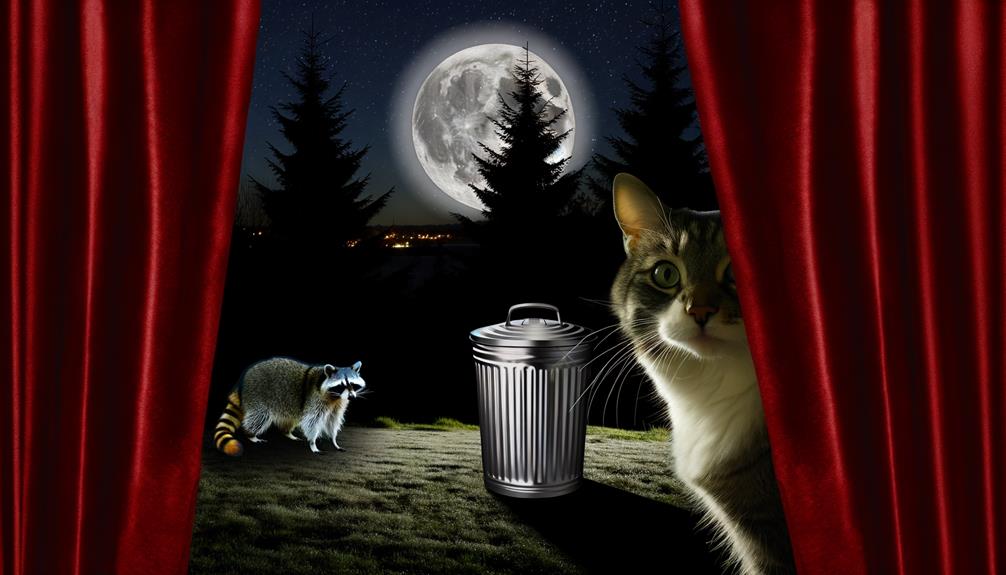Cats Afraid of Raccoons?
Yes, cats often display signs of fear in the presence of raccoons. This reaction is primarily because raccoons are typically larger, sometimes exhibit unpredictable and aggressive behavior, and can be a potential source of diseases.
The encounters between cats and raccoons vary notably, with results ranging from benign curiosity to dangerous conflicts, often influenced by individual animals' personalities and territorial instincts. It's critical to monitor these interactions and take proactive protective measures for your feline friends.
Understanding the complexity of cat-raccoon dynamics offers insightful perspectives for effective mitigation strategies.

Key Takeaways
- Cats may exhibit fear towards raccoons due to their larger size, strength, and aggressive nature.
- Disease transmission risk from raccoons can also trigger a fear response in cats.
- In cat-raccoon interactions, cats can display varying behaviors, from caution to aggression, based on individual characteristics and territorial instincts.
- Outcomes of these interactions are unpredictable, with potential conflicts arising from territorial disputes.
- Implementing protective measures, such as secure outdoor spaces and safe feeding practices, can help ensure cat safety around raccoons.
Understanding Feline Fear Response
To understand whether cats are afraid of raccoons, one must first explore the intricacies of the feline fear response, a complex phenomenon deeply rooted in the biology and behavior of these enigmatic creatures. Cats, like all animals, possess an instinctual fear response designed to protect them from potential threats. This response is triggered by various stimuli, such as unfamiliar sounds, sudden movements, or the presence of other animals.
When confronted with such stimuli, a cat may exhibit a range of behaviors, from avoidance and hiding to defensive aggression. However, it is essential to note that these behaviors can be influenced by numerous factors, including the cat's past experiences, its environment, and its individual temperament. Understanding this diversity can help us decipher the feline-raccoon relationship.
Raccoons: A Potential Threat?
Building on the understanding of a cat's fear response, it's worth evaluating if raccoons pose a significant threat that would trigger such a reaction in our feline friends.
Size and Strength: Raccoons are generally larger and stronger than cats, which could potentially intimidate them.
Aggressive Nature: Raccoons can be quite aggressive when threatened or cornered, posing a potential danger to cats.
Disease Transmission: Raccoons can carry diseases such as rabies, which could be fatal to cats if transmitted.
Territorial Disputes: Raccoons are known to invade territories, which could lead to confrontations with resident cats.
Through a careful evaluation of these factors, it's clear that raccoons can indeed pose a real threat to cats, justifying their fear response.
Cat and Raccoon Interactions
Observing the interactions between cats and raccoons can provide valuable insight into their behavioral dynamics and potential conflict scenarios. It is important to note that these encounters often vary, largely depending on the individual animals' personalities and their previous experiences.
While some cats may display signs of curiosity or playfulness, others may exhibit fear or aggression. Raccoons, on the other hand, are typically more assertive, but their behavior can also range from indifference to curiosity or even hostility.
This unpredictability can make it difficult to predict the outcome of these interactions. However, it's clear that the potential for conflict exists, as both species are known to fiercely protect their territories and resources. This understanding can guide cat owners when they encounter raccoon sightings in their surroundings.
Protective Measures for Cats
Given the potential for conflict between cats and raccoons, it is important for cat owners to implement certain protective measures to ensure the safety and well-being of their feline companions.
- Secure Outdoor Spaces: Make sure that yards are fully fenced and devoid of easy climbing access for raccoons.
- Nighttime Confinement: Cats should be kept indoors at night when raccoons are most active.
- Safe Feeding Practices: Avoid leaving pet food outside, as it can attract raccoons.
- Vaccinations: Regular vaccinations can protect cats from diseases raccoons may carry.
These measures, when employed diligently, can significantly decrease the likelihood of encounters between cats and raccoons, safeguarding your feline's freedom while maintaining their safety.
Case Studies: Cats Vs Raccoons
While implementing protective measures is indeed an essential part of safeguarding our feline companions, understanding the dynamics of cat-raccoon encounters through real-life case studies can offer valuable insights.
In numerous instances, we observe that raccoons, driven by curiosity or hunger, venture into areas inhabited by cats. The cats, often territorial, react with caution, and if forced, aggression. One case study demonstrated a cat successfully scaring off a raccoon, showcasing the cat's assertiveness.
However, another instance highlighted the potential dangers when a cat was cornered by a raccoon. The cat escaped, but not without sustaining minor injuries. These case studies underscore the importance of proactive measures and understanding each animal's behavioral patterns to guarantee a peaceful coexistence.
Conclusion
To sum up, feline fear response and potential threats from raccoons require understanding and proactive measures. Interactions between cats and raccoons can result in various outcomes, emphasizing the significance of protective measures.
Insight from case studies underscores this point. As a result, the relationship between cats and raccoons is a complex one, necessitating further examination to safeguard the welfare of our feline companions in light of potential raccoon interactions.






